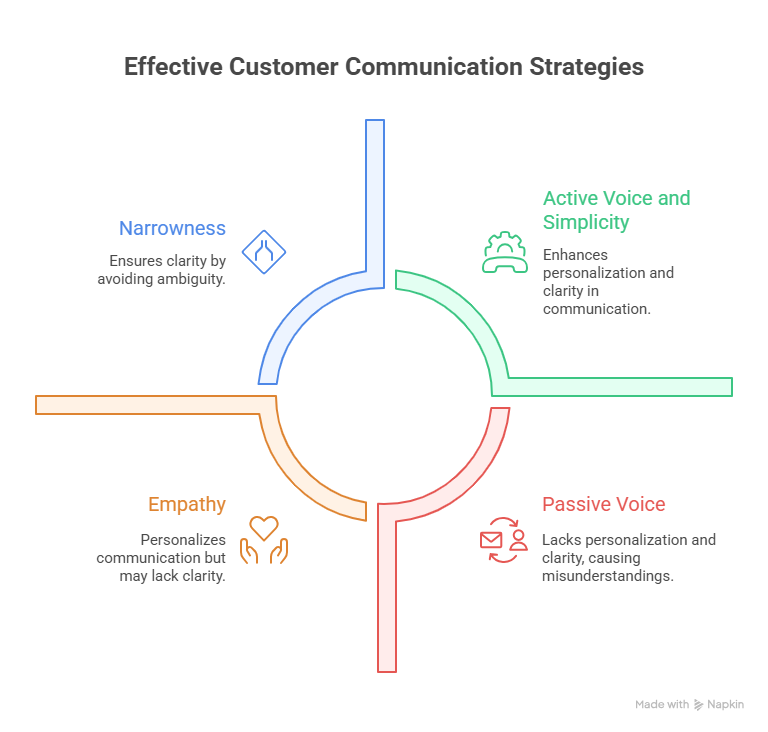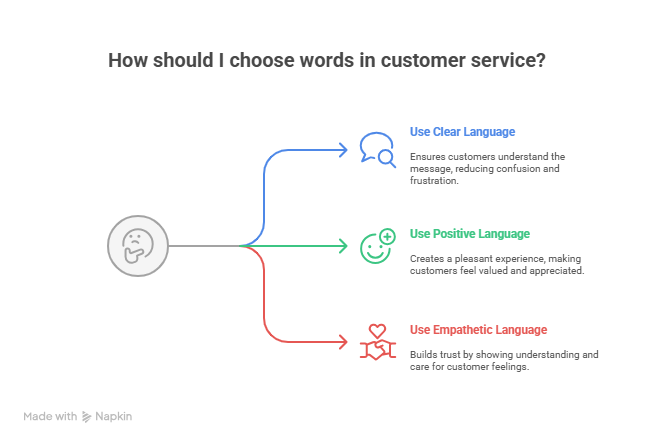Power words for Customer Service
10 Jan 2020 By: Maria Rush
Updated

Power words for Customer Service: What to say to your customers (and why, and how).
We have all heard the saying, “It’s not what you say, but how you say it that matters.”
Of course, it’s no surprise that the tone of voice matters. However, research by conversation analysts suggests that it’s not just how you say it. It’s also what you say, when you say it, and why you say it.
Despite the technological barrier established by phones and computers, customers can still feel the tone, intention, and meaning in all conversations. So when selecting words for customer interactions it’s essential to consider various techniques of effective communication.
Customer service phrases matter.
What powerful words to say to customers, how to say it, and why?
Here are four characteristics of communications to consider when thinking about customer service choice of words.

1. Active Voice and Simplicity
Active voice sets the tone to customer communications and makes communications more personal and casual. Using simple, active language should guide customer communications regardless of its medium or channel – be it live chat service, emails, or texts. Simplicity improves engagement, ensures a faster pace, and prevents misunderstandings.
Folks at Rubuss hit the nail on the head with this little trick to spot positive language when making customer service choice of words:
Passive voice is the enemy of honesty and transparency – two virtues that customers rightly value highly in their interactions with brands. The issue with using the passive voice isn’t just that it sounds boring and zombie-like; it’s that it distances you from the statement you’re making, and that can come across as disingenuous. (James Freeman-Gray, Rubuss.com)
But active voice doesn’t just mean using active sentence structure. It also means selecting active verbs and phrases.
Train your customer service representatives to understand the importance of phrasing when thinking about good customer service choice of words. Encourage them to use more positive and open-ended statements. There are many substitutions to consider working into your conversations.
Consider the difference between “I can do that for you” and “I will make sure to do that for you.” Try saying, “I will absolutely help you out with that,” instead of “I can help you out with that.”
These active phrases resonate better with customers and provide a more personalized customer experience.
People respond positively to words that are active rather than passive. There is a world of difference between “I can” and “I will.” (Michael Hess, Moneytalk, CBS News)
2. Empathy
There is one thing customers want in addition (and perhaps sometimes even more than) for customer service agents to solve their problems. It’s to feel special and heard. Customers want companies and representatives to care about them. They want empathy.
A study by Penn State University backs this up. It reveals that people using webchat are happier with the customer experience if agents use emoticons and type and respond rapidly to questions. Those that used emoticons were felt to empathize more, according to the study, which was based on a survey of over 100 students recruited to take part in chat sessions on a fictitious eCommerce site. (Customer Think)
And agents can provide empathy by thinking carefully about customer service choice of words. Here are some examples of phrases that show empathy to customers.
3. Narrowness
Being specific in customer service choice of words does more things than one.
First, it avoids any misunderstandings. If something doesn’t seem clear it’s in everyone’s best interest to confirm and verify what the customer is saying.
Second, asking open-ended questions that do not prompt an ambiguous or short answer, can lead to learning more about the customer.
John Heritage and Jeffrey D. Robinson studied the difference a simple word change can make by testing the substitution of the word “some” for the word “any,” and analyzing the impact the change had on doctor-patient interactions.
The catalyst for the study: Patients hadn’t voiced all of their concerns and were leaving appointments dissatisfied. This was only resulting in unnecessary obstacles for doctors and their patients later on in the care process (sound familiar?).
Thus, the researchers decided to tweak the doctors’ wrap-up questions from “Is there anything else we need to take care of today?” to “Is there something else we need to take care of today? The difference was subtle, but it made a big impact.
By modifying one word during patient questioning, doctors changed the course of the visit. As a result, medical personnel heard more concerns, patients were more satisfied and efficiency improved overall. The scientists noticed that “anything” most often elicited negative responses, and rephrased the question to be more inviting and open to feedback.
4. Positivity
Customers seek support in times of trouble, usually. Customer service choice of words, therefore, should not make matters worse by bringing or upholding negativity.
Staying positive throughout communications with the customers reinforces professionalism, lightens the mood, and deflect any negativity with which the customer might have entered the conversation. Agents can promote positivity by using some of the following techniques. (LiveHelpNow)
There are certain phrases that turn the entire customer communication positive, regardless of the outcome or the customer’s attitude. There are many guides available when it comes to positive interactions, but here are some musts on communicating positivity.
- Start with a positive greeting – be personable, friendly, and upbeat. (LiveHelpNow)
- Avoid language that shows doubt and negativity (such as “I’m not sure,” “I don’t know about that,” or “That’s not something I can help you with.”) – Vocalcom.com
- Empower the customer (phrases such as “That’s exactly right,” “I understand,” and “That’s a good question” empower the customer and validate his feelings. ) – Vocalcom.com
- Avoid dry “yes” or “no” answers. Phrases like “to be honest with you…” and the impersonal “It’s the company’s policy” all carry negative connotations, make communication stagnant, and generally make the customer feel disregarded. (LiveHelpNow)
Why is Word Choice Important in Customer Service?

Word choice in customer service isn’t just about saying the right thing—it’s about shaping the entire experience for your customers. The words you choose can calm a frustrated customer or make things worse. They can make someone feel appreciated or question your company’s professionalism. When you use clear, positive, and empathetic language, you’re not just solving problems—you’re building trust and loyalty. And let’s face it, people remember how you make them feel. So, if you want happy, returning customers, your word choice matters more than you might think.
Bottom Line
The choice of words in customer service is far more than just a simple exchange of information—it’s a powerful tool that shapes the customer experience. From using active voice to expressing empathy, narrowness, and positivity, your words can build trust, resolve issues, and leave a lasting impression on customers. By focusing on how and why you say what you say, you can transform every interaction into an opportunity for meaningful connection and customer satisfaction. To help you get started, here’s a free list of power words you can use to inspire positivity, trust, and connection in your customer interactions.
If you’re ready to take your customer service to the next level, check out HelpSquad’s BPO Services. With expert support teams trained in customer communication best practices, HelpSquad can help you deliver outstanding service and improve your overall customer experience. Reach out today to learn more!


